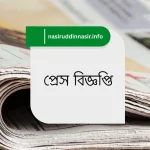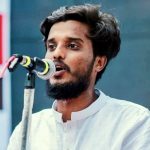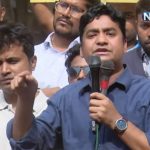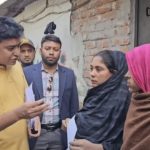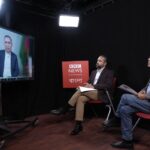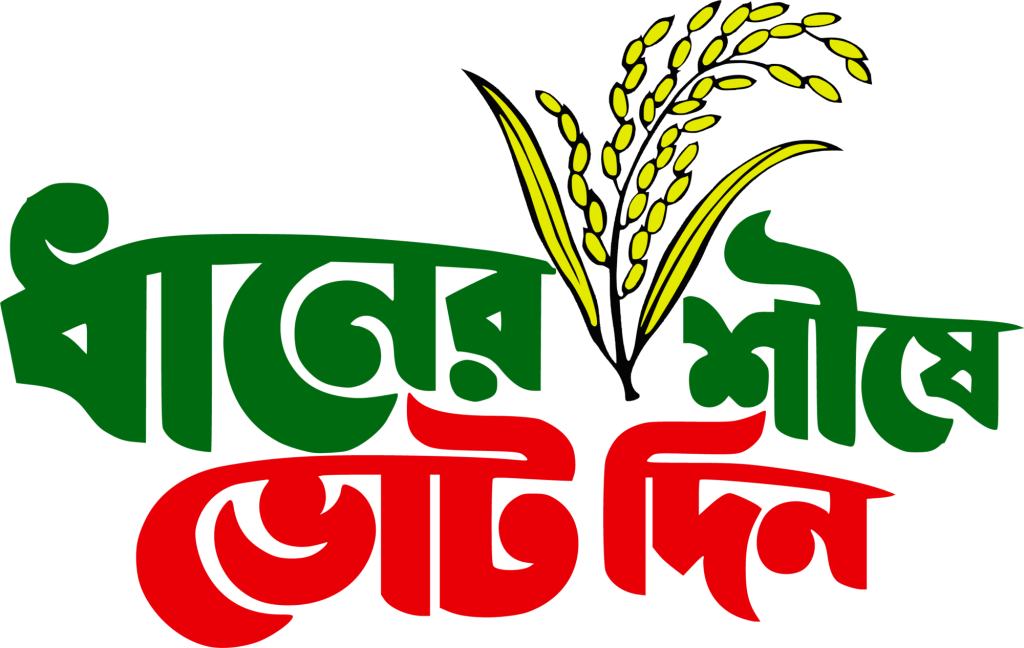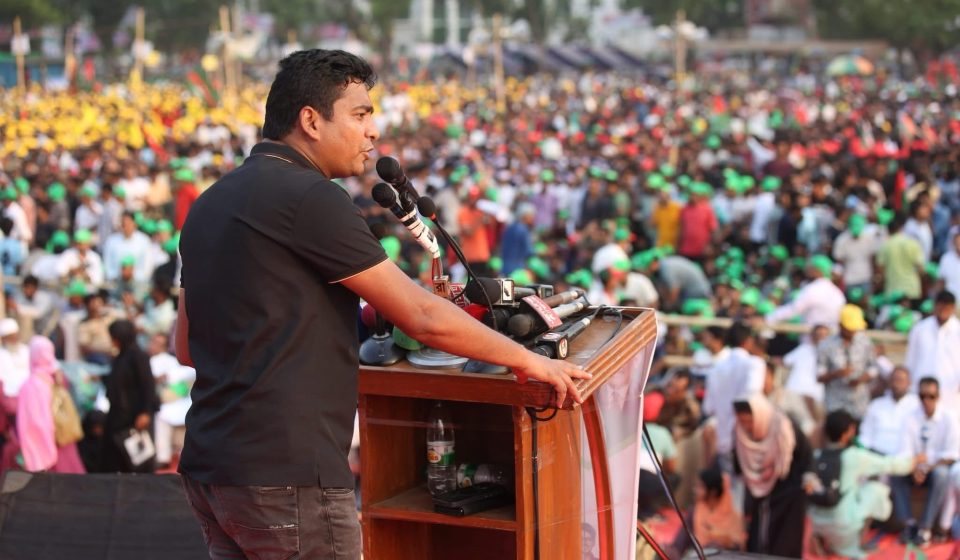
All freedom-loving political forces were key partners in the July Uprising: Nasir
The mass uprising is an important chapter in our history. Every citizen of Bangladesh, regardless of party or opinion, has been involved in this uprising. All the freedom-loving political forces were one of the partners in this uprising. They made the July mass uprising successful with their utmost strength. In an interview with Bangladesh Sangbad Sangstha (BSS), Chhatra Dal General Secretary Nasir Uddin Nasir said this about the July uprising.
July has appeared among us again after a year. Nasir, who was a victim of torture and torture for a long time, has recounted the various stages of the July Uprising. He is a student of Sir A.F. Rahman Hall of Dhaka University in the 2007-2008 session. He was involved in student politics from the beginning of his university life. He was nominated as the General Secretary of Chhatra Dal in March last year. Nasir played an active role in the beginning of the new Bangladesh through the mass uprising after overcoming the long struggle of the fascist regime. Various aspects of Chhatra Dal's participation in the uprising have emerged from his face.
BSS: At what stage did Chhatra Dal join the July Uprising?
Nasir: The Nationalist Chhatra Dal has been fully supporting the anti-quota movement since the beginning. Our strategy from the beginning of the movement was that the familiar faces of Chhatra Dal would not come forward. For strategic reasons, Chhatra Dal did not want to join this movement organizationally at the beginning. But on July 8, we publicly announced our support for the movement. We stated our position on the quota that day. Chhatra Dal leaders and activists were present at the movement that took place in July all over Bangladesh, including Dhaka University. We have wanted the quota movement from the beginning not to be under any political banner. We talked about this with Nahid and Asif at that time. From the beginning of July, Dhaka University students tried to give this movement an organizational basis. Two people from Chhatra Dal were placed in the first committee of the anti-discrimination student movement. A few people from all student organizations were placed in the coordinating committee. Later, 3 people from Chhatra Dal were added to the coordinating committee. A total of 5 people were given to the anti-discrimination student movement committee. Those who led the movement suggested that the names of junior Chhatra Dal activists be added. Because many of the senior student leaders were familiar faces of the Chhatra Dal at that time.
BSS: On July 14, Dhaka University students came out of the halls at midnight chanting Razakar slogans. What were your instructions to the Chhatra Dal at this stage of the movement?
Nasir: During the quota reform movement in July, Sheikh Hasina called the agitators the granddaughters of the Razakar. In protest, students took out a procession at Dhaka University that night. Many leaders and activists of Dhaka University Chhatra Dal lived in the halls at that time. Many did not have the opportunity to stay in the halls. We were already associated with the students in the halls. Every leader and activist of Dhaka University Chhatra Dal participated in that procession. That night, the leaders and activists of the present Chhatra Dal added the part of the slogan 'Who said who said, tyranny tyranny' to the slogan 'You are who, I am who, Razakar Razakar'. The leaders and activists of the Chhatra Dal were the first to dare to call Sheikh Hasina a 'Razakar' on the ground of Dhaka University.
BSS: How did you receive the news of the deaths of martyrs Abu Sayeed and Wasim Akram?
Nasir: On July 15, Chhatra League leaders and activists attacked female students at Dhaka University. Many Chhatra Dal leaders and activists were also injured that day. Chhatra League leaders and activists also attacked the injured students at Dhaka Medical College. That night, many Chhatra Dal leaders and activists were arrested. The next day, on July 16, we held a procession in Naya Paltan and held a press conference to protest the arrest. While we were at the program, we heard about the killing of Abu Sayeed in Rangpur. Shortly after, Wasim Akram, a Chhatra Dal member of Chittagong College, was also killed by Hasina's police. That day, Wasim posted on Facebook, "Let's go to Sholashahar." He united everyone in Chittagong city. In this way, Chhatra Dal leaders and activists united the protesters across the country. Wasim's post represents the entire Chhatra Dal.
I was first informed about Wasim's martyrdom by BNP acting chairman Tarique Rahman. Instructions were given to leaders and activists of all Chhatra Dal units everywhere where there was a movement in Bangladesh. Instructions were given to our leaders and activists across the country that they should be involved from the beginning of the movement.
BSS: On the night of July 16, students threw out Chhatra League leaders and activists from the hall. Were you involved in this process?
Nasir: After the attack on the 15th, the movement took the form of a comprehensive movement. After that, I jumped in and instructed every unit of Chhatra Dal to join the movement. On the night of July 16, Chhatra League leaders and activists were expelled from the halls of Dhaka University. That day, Chhatra Dal President Rakib Bhai, I and a current student advisor had a one-on-one meeting. The topic of the meeting was how to expel Chhatra League leaders and activists from the halls. Chhatra Dal had a large share in the process of expelling Chhatra League leaders and activists from the halls. This was an important milestone.
BSS: After the closure of public universities, students of private universities became deeply involved in the movement. How did you involve your private unit in this process?
Nasir: After the 17th, the students of private universities further accelerated the movement. We have been in touch with the students of private universities through the private university committee of Chhatra Dal. Especially the role that the students of private universities played on Badda Rampura Road is unprecedented in history. If the students of private universities had not played the role that they played after the 17th, we might not have seen this situation. The students of private universities have proven wrong the view that society had towards them regarding politics, social policy, economy, etc. They have shown that they too can save Bangladesh from any evil force by giving their blood.
We were worried that if Dhaka University was closed, the scale of the movement would be stunned. We had doubts about whether we would be able to continue the movement. When we contacted the leaders and activists of the Chhatra Dal of the private university, they said that the movement would continue from the next day. But the way the students of the private university contributed the next day changed the overall perspective of the people of this country. They spontaneously joined the movement without any kind of leadership. We should remember this contribution of the students of the private university for a hundred years.
BSS: What is your assessment of the contribution of madrasa students in this movement?
Nasir: Madrasa students took a strong position on Jatrabari road since mid-July. The Awami League has tortured madrasa students extensively in the past years. The role played by madrasa students in Jatrabari is unforgettable. If the movement had been less in Badda, Rampura and Jatrabari, perhaps the picture of this mass uprising would have been different. The level at which the movement has reached after July 17, there was no other way but to overthrow the government. The government has said that a third party has entered the movement. Yes, if the third party had not entered, the government would not have fallen. One side of the movement has also said that we want quota reform, we do not want the government to fall. If the third party had not entered, this movement would have been stunned at some point. I want to say unequivocally, we have entered the third party. That is why the murderer Hasina has left at the end of the movement. If the third party had not entered, Hasina would not have fallen. The fact that a third party entered is true.
BSS: What strategies have you adopted to make this movement successful?
Nasir: Since the day Abu Sayeed and Wasim were martyred, we have divided the entire Dhaka among ourselves. Those who were involved in this movement from the beginning knew where we would be, in which part of Dhaka who would be from Chhatra Dal. We had indirect contact with Shibir during this movement. Abdul Quader of the Anti-Discrimination Student Movement and Rashed Khan of the Gana Odhikar Parishad coordinated us with Shibir. During the movement, they used to tell us where the Shibir would be and where we would be. Towards the end of this movement, everything about Chhatra Dal was coordinated with Abdul Quader. The indirect contact that Abdul Quader had with the acting chairman was also through us.
BSS: What was the most terrifying moment for you in the entire July-August coup?
Nasir: July 19 was a terrible day in my political life. We are alive thanks to Allah. It still feels incredible to be alive. There was a bloody clash in Paltan area on July 19. The only day in the entire movement that there was a clash in Paltan area was on July 19. That day, some of our comrades were martyred at close range. Some of those standing next to me were shot. Imran from Dhaka College, who was holding me and standing next to me, was also shot. I myself was shot by a rubber bullet that day.
BSS: You were used to internet-based communication for a long time. How did you communicate after the internet was shut down?
Nasir: The first curfew was declared on the night of July 19. The internet was shut down that day. My communication with Chhatra Dal President Rakib Bhai was also cut off that day. It was very difficult to maintain communication without the internet at that time. We had been in the movement for a long time. So we were used to internet-based communication. It happened that many of us have not had contact with our offline numbers for several years. The sudden shutdown of the internet has created a kind of communication problem among our leaders and activists. My communication with Rakib Bhai was also cut off from the night of the 19th. The acting chairman Tarique Rahman established the communication between the two of us. The acting chairman contacted me at the house where I was staying that night, took my number and gave it to Rakib Bhai.
That night, Tarique Rahman advised me to break the curfew the next day. That day, he said, as a political figure, we have to ensure that the curfew is broken. We broke the curfew and held the first procession in the Shantinagar area. Jamuna Television broadcast it, but later removed it under pressure from the government.
When the internet was down, our team was given small phones. We were instructed to use one phone one day. We used it and threw it away. That was our instruction. The number was changed every day. When we started using the new number, we would give our number to Salahuddin Bhai. He would give our number to our acting chairman. He would give our numbers to others. So that we could contact others. In this way, we used to communicate with each other until August 5.
We used to carry a small router with us during those fascist times to use the internet. We were used to communicating that way for 14-15 years. We were cut off from our family for a long time. Our parents live in the village. They couldn't just suddenly communicate online. Again, if some of us communicated with their parents offline, the law enforcement agencies would arrest their parents.
BSS: In which areas did you coordinate on behalf of the organization during this movement?
Nasir: I was in Mirpur, Banasree, Aftabnagar, Uttara during the movement. We would communicate 2-3 kilometers away from where we stayed at night. I would leave the phone with which I communicated there and go to another place. On behalf of the party, we would coordinate the various programs of the movement. We would talk about the outline of the program with Abdul Quader and others who led the movement from outside. Many times we would discuss on mobile. Many times we would coordinate by going to somewhere where there was internet. Once I went to a house for a meeting where there was wifi. Suddenly, the wifi went off shortly before the meeting. Later, I went to Mirpur from Uttara by rickshaw to join the meeting. Everyone at the meeting was worried whether I had been arrested or not. We had a very difficult time.
One night I was informed that I would have to join the movement on the streets of Badda. That night I was in Mirpur. When I left for Badda in a rickshaw at night, some leaders and activists of Awami League, Jubo League, Chhatra League were stationed in the Banani area. Everyone had weapons like sticks, hockey sticks, etc. in their hands. At that time, since the Awami League was openly carrying out armed attacks in a life-and-death struggle, I was very scared that night. But, I was worried about what would happen. I had to reach my destination. This has happened several times. The acting chairman used to give us courage in such situations. He used to support us like an elder brother.
BSS: There is a six-hour time difference between London and Bangladesh. In such a situation, would Tarique Rahman have had any problem in maintaining contact with you?
Nasir: There was a big time difference between us and London. But whenever I called Tarique Rahman during July and August, he immediately picked up the phone. He would get news of the incidents outside Dhaka before us. He would give us instructions at every stage. He had contacted all the BNP martyrs and injured people during the entire movement. He would give us courage. He would give us instructions on what to do to avoid arrest.
BSS: What were your thoughts at the time about the one-point announcement?
Nasir: Since the end of July, our party was saying that there is no alternative to a one-phase. Standing Committee member Salahuddin Ahmed told us, you should talk to them about how to move towards a one-phase. Everyone had the same idea, we have to move towards a one-phase. We have no other option but a one-phase, so let us talk to the students. Since the end of July, we have been pushing them for a one-phase. There is no option but a one-phase now. Salahuddin bhai also used to say this. At that time, Rakib bhai and I were forbidden to go to the same spot. On the 3rd, Rakib bhai was at Shaheed Minar. On the 4th, I was at Shahbagh.
That day, hundreds of people died across the country. I felt very tired coming from Shahbagh to Banasree. That night, I was talking to the acting chairman. I was expressing a little helplessness to him. So many people were dying. Towards the end, so many leaders and activists of Chhatra Dal were being martyred. I was a little disappointed. He encouraged me and said that this would be resolved soon. That day, I was talking to Abdul Hannan and Quader that the program schedule had changed.
BSS: What are your thoughts on the new Bangladesh after the July coup?
Nasir: The culture that Chhatra League established in the last 15-16 years, especially the culture of beating people to death, the mass room culture, the culture of occupation that they have established, should be stopped forever. In the last one year, we have not seen any incident of forcibly taking people to processions in Bangladesh. Guest rooms have disappeared. The culture that Chhatra League has established in student politics of beating people to death should be stopped forever. The attempt to build merit-based student politics should be started. I think the trend of occupation on campus, forcibly taking people to processions, torturing women, beating people to death, and attacking those who do not like their opinions should be stopped forever. We are trying to build a positive and acceptable student politics.
Media Coverage:
All freedom-loving political forces were key partners in the July Uprising: Nasir | BSS
Nasir, who was a victim of torture for a long time, recounts the various stages of the July Uprising... | TheDailyCampus




